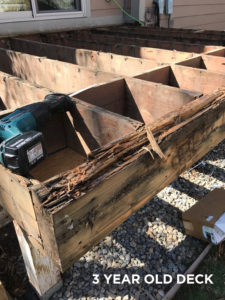Pressure Treated Wood Still Needs Protection from Rot
By Dave KilePressure Treated Wood provides protection against wood rot and insect damage, but it is not infallible.
Builder Tim Carter explained in this Washington Post article that there are several reasons pressure-treated wood can deteriorate quicker than expected. According to Carter, “The bottom line is that wood rots and many things can go wrong in the treatment process causing premature failure.” Perhaps the chemicals didn’t penetrate deeply enough, so screw holes invite the possibility of water damage. Cracks in the wood also encourage rot.
Carter stated, “Any number of products are available to stop water from entering the treated wood. Last year, as part of my deck reconstruction project, I applied a special tape on top of my wood joists before I installed the decking. This tape has a butyl rubber adhesive and seals around the shaft of the screws used to attach the hidden fasteners for the decking.”
New standards were introduced in 2016 to encourage the use of pressure-treated wood intended for ground contact on above-ground projects. “But some failures continue to be reported, typically around poorly flashed ledger boards, where water collects on wide deck boards, and in the seams between built-up beams,” according to ProRemodeler.com.
Rot is a Real Threat for Any Wood
 Pressure-treating can make wood water-resistant, but it’s not 100 percent rot-resistant. Any time the wood moves, bends, or cracks, water can enter. While this may seem worrisome, the key is to keep the water away.
Pressure-treating can make wood water-resistant, but it’s not 100 percent rot-resistant. Any time the wood moves, bends, or cracks, water can enter. While this may seem worrisome, the key is to keep the water away.
On the Ask the Builder website, Carter endorses Trex Protect, as the product he prefers. “I have faith in the product and have taken steps using modern new products to minimize water infiltration into both the new deck and the existing treated lumber,” he said.
Trex Protect’s butyl tape is easy to use and convenient to apply. Available in three widths – 1-5/8” (41.3 mm) for joists, 3-1/8” (79.4 mm) for beams 11″ (279.4 mm)—Trex Protect is applied as a cap (vs. wrapping) to horizontal and vertical surfaces, allowing the wood to breathe. It comes with a 25-year warranty that guarantees you will get more life out of your deck.
So if you’re installing a pressure-treated wood deck, don’t skip the essential and low-cost step of protecting your beams and joists. The small cost is well worth adding years to your new deck.
